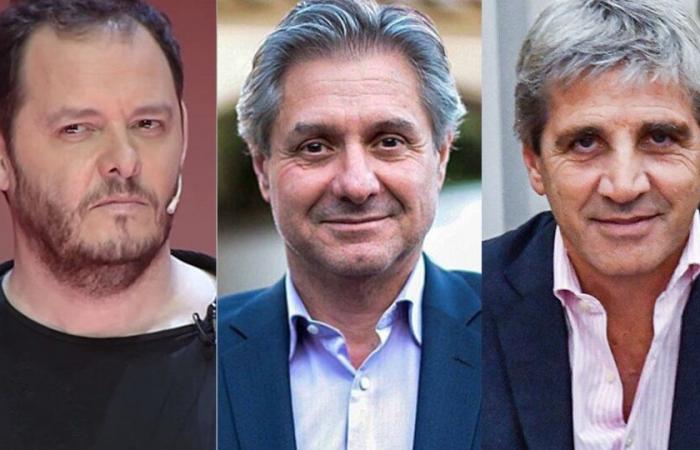
John Moore is the head of Latin America at the Morgan Stanley bank. A few days ago, in an interview, he suggested, without euphemisms, that, if Argentina continues with the adjustment and “consolidates” the fiscal and tax reforms, there will be new investments from that entity. To the common public, it could be read as common conditioning of potential investors, but the message is more complex. Morgan Stanley is one of the five large pools that handle the largest volumes of money from global millionaires in the world.. Almost at the same time and with the same meaning, Facundo Gómez Minujin, head of the JP Morgan bank and head of the American business chamber AMCHAM, demanded guarantees that the tax reforms be passed in Congress, considering them “insufficient” as they were modified. in the Bases Law in the Senate.
In short, Moore and Gómez Minujin fight so that the fortunes they manage pay less taxes than they already pay, which are few in relation to capital and profits. With a serious problem: your recipient of the message, The Argentine government is full of speculative bankers, just like Moore and Gómez Minujin, with the same logic and in sensitive places for the exercise of economic policy.. A few hours ago, in fact, speculation began that, after the resignation of Luis Caputo’s vice minister, the cavallista Joaquín Cottani, the Chilean José Luis Daza, another former JP Morgan, will take over.
Today, The Economic Cabinet, the Central Bank and even the President’s team of economic advisors are monopolized by former global bankers from Morgan, Goldman Sachs, HSBC, Deutsche Bank and other international entities.. An extra fact: these same characters have already integrated, for the most part, the economic cabinet of Mauricio Macri, a process that not coincidentally ended in a record recession, with the release of stocks and initial celebration of the markets, entry of swallow capital and subsequent flight , plus a process of external debt that culminated with the credit of 54 billion dollars that the Monetary Fund (IMF) gave to Macri to try to save his government. In those same terms, there is a debate today about the financial scam, the adjustment of the State, interest rates and taking on debt to obtain dollars that do not arrive due to the recession. And return to the IMF, adding debt to the largest debt agreement in history, which those same bankers took in 2018. The entire experiment is what precipitated, for example, the departure of Cottani, who in the arc of the conservative right is among the adjusters with some contact with the real variables.
This also explains why Milei – a macroeconomist – never knows how to answer how the salary will beat inflation in a period of economic depression. Bankers also do not know how to answer an extremely simple question. Or they do it with the books, which in this administration burned all logic of the processes. For all this, many of the critics of Milei’s management warn the President that “this is the revenge of the Wall Street gangsters.” Milei likes everyone, because he prefers the daring ones who don’t look at collateral damage and attack. Another additional fact: the bankers’ war that took place in the PRO cabinet, roughly a battle of caputists and Sturzeneggerists, is happening again today in Milei’s cabinet. And Sturzenegger’s ranks are accelerating against Caputo because they do not see palpable results and they glimpse him in the face of an imminent macro crisis. The same internal procedure that occurred in 2018 before the IMF. The same movie, twice, in less than a decade.
The bank always wins
The pilgrimage of consumer and industrial entrepreneurs from the Argentine Industrial Union (UIA) to the offices of the Minister of Economy, Luis Caputo, is constant and always with the same ending. “Minister, we don’t sell anything, activity is very low,” they ask him. He answers that “the macro will solve it”. A deja vu for the ceos, which is beginning to resign even the most faithful converts of libertarianism. Caputo worked at JP Morgan and Goldman Sachs. For the BCRA, he chose Santiago Bausili, who worked 9 years at Deutsche Bank, 6 of which were spent in New York; where he coincided with Caputo. Then, when the same policy they apply today failed in the Macri era, they set up the consulting firm Anker together, from which Martín Vauthier and Federico Furiase also emerged, today directors at the BICE bank and the Treasury.
Banco BICE, whose mission is to promote productive projects, is also full of cadres who are dedicated to the business of financial speculation. Felipe Núñez, an economist very active on social networks, is today a director at the entity. He comes, among other works, from Alchemy Valores. In 2017, during the Macri Government, the National Securities Commission (CNV) sanctioned two stock brokerage firms for irregularities in operations to artificially increase the prices of the MEP and CCL dollar. One of them was Bullmarket, owned by the libertarian legislator and member of Milei’s advisory team, Ramiro Marra, the other, Alchemy.
At the Central Bank, Caputo armed the resistance to Sturzeneggerism, also with speculative bankers. Vladimir Werning, vice president of the BCRA, worked at JP Morgan in New York and became known in the past for being deputy finance minister of Alfonso Prat Gay, who was also a Morgan banker.. He carries his fanaticism for La Renga on his back, something that, for obvious reasons, does not read well with Wall Street. Werning was also a senior manager at AR Partners, one of the ALYCS with the most clients in the country.
At the end of last year, a week before the ballot, Argentina ran out of gasoline for several days. The candidate Sergio Massa took aim at Alejandro Lew, financial director of YPF, who had decided to stop two key refineries for repairs, without also enabling dollars to cover the supply with imports. Miguel Ángel Pichetto mentioned him in Parliament as the one who “made Milei win.” Days after that election, not coincidentally, Lew became second vice president of the BCRA. The character in question was executive director of the HSBC bank. At the British entity based in Buenos Aires, he was also part of the capital market debt origination team. He also worked at JP Morgan, where he was functional vice president of Chase Bank, Buenos Aires branch, being in charge of the relationship team with institutional and corporate clients of the bank’s money desk. He also worked at Banco Itaú.
An “imported” stick
The Milei Government has an operational problem that is central. From the first magistracy on down, none of the cabinet cadres stood out in their private activity. ANDIn this scenario, the Golden Boys are promoted because, in their role, they can show decision-making credentials in places of real weight.. That and the extroverted and borderline character that they usually have, conquered a Milei who sticks to that type of profile.
For bankers it is all profit. Public management, in general, also nurtures future businesses. The most notable case is that of Mauricio Macri’s former Minister of Economy, Nicolás Dujovne, who thanks to the personal cards he obtained at the G-20 held in Argentina, was able to expand his client portfolio to today have a very large consulting firm. of private capital. Along the way, Dujovne worked for Citibank, Banco Galicia and Patagonia.
Last weekend, Caputo’s deputy, Joaquín Cottani, resigned from office in disagreement with the “timba” profile in the Treasury and surrounding areas. His dismissal had been ready for several days, because he had been complaining that Caputo was not addressing the social effects of the adjustment. Days before that, the Chilean-Argentine José Luis Daza, who will presumably be his replacement, had visited La Rosada at least twice. Advisor to the Chilean right and friend of presidential candidate José Antonio Kast, Daza worked at Morgan with Caputo. Later, they also met at Deutsche Bank. “In the Treasury, it is more common to see a banker than people who have worked in the State,” he joked before Page I12 someone who has frequented those hallways for decades. Another case: Nicolás Marcelo Ferro, the second in the ranking of the Superintendence of Financial Entities, is also a JP Morgan man. He joined, among other positions, the Risk Department.
Daza, meanwhile, is about business and friendship. They are intimate with Caputo and speak the same language, that of the markets. In 2007, Daza founded the investment fund QRF, based in New York, with Demian Axel Reidel.. “Satan” Reidel, as this newspaper reported, is Milei’s new fetish, who contributes to her speeches, introduced him to the idea of Artificial Intelligence and accompanied him to the G-7. Reidel was head of the Emerging Markets division at JP Morgan, the same task he performed at Goldman Sachs. The President’s emotional and ideological permeability made Reidel convince him that Argentina’s economic matrix can depend on AI. The data baffles businessmen in the real economy, who are the majority. Above all, because there seem to be no alternatives.





